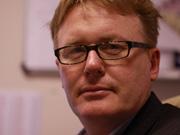Using evidence to make the case for FE

As someone who has worked on Baroness Sharp’s Commission of Inquiry into Colleges in their Communities for the best part of a year two things stand out following the report launch at the AoC Conference on Tuesday. The first of these was how receptive to the proposed actions Skills Minister John Hayes was in his speech—he basically told us all to get on with it! The second was how important, particularly at these times of great change, it is to take the time to undertake considered inquiries into further education and skills.
Much has been said already about the Dynamic Nucleus report and the actions for colleges, government, local authorities and sector support bodies like NIACE. Indeed we will be working closely with the AoC, the 157 Group, LSIS and others to begin to enact the recommendations. This will start with dissemination activity across the country to tell people about the report and develop workable route maps to achieving the planned actions.
The key thing is that the sector, with the support of government agencies, will take the lead in enacting the reforms. This is an approach we have taken throughout the Inquiry itself. In fact the original idea for it came from colleges themselves. NIACE members on our Further Education Advisory Group chaired by Geoff Hall (then Principal of New College Nottingham) wanted to follow up on the ground-breaking work done by the Inquiry into the Future for Lifelong Learning, which saw colleges as the ‘institutional backbone’ for adult learning in more autonomous local areas. The brilliant Learning Through Life report of 2009 prefigured much of the thinking in the Coalition’s localism agenda and Ursula Howard’s paper for that inquiry famously described colleges as ‘the giants who have learned to dance, but they have not yet written the music or the choreography.’
Now colleges clearly have the green light to do more than dance to the music written by government but compose it as well. To do so the report says, as well as government letting go (by decreasing red tape and funding rules), colleges have to let go as well; with their new freedoms they will have to work more closely with communities of local people and employers, with local partners to co-design provision that meets local needs as well as national priorities.
Of course there are implications in all this for other FE providers outside of the college sector. Independent providers in both the private and voluntary sector, make huge contributions to the life chances of adults, as do local authorities who deliver skills training as well as commission it. Any forward planning needs to consider their views too.
But, largely thanks to our expert commissioners and observers, Baroness Margaret Sharp’s adroit chairing and negotiation of the changeable tidal currents of policy making, we have a report that sets an agenda for the coming year.
My second point is about the process of inquiry itself. NIACE has a done a number of inquires over recent years—on ESOL, disabled staff, numeracy and most recently adult literacy. We don’t undertake these as pieces of academic research to sit on shelves; we plan them as timely interventions into the policy debate. They combine academic rigour with intention of having a positive impact on adult learning.
My reflection on this inquiry about Colleges is that it was great to work in partnership with AoC and the 157 Group, who were both generous of their time and expertise, keeping us focused on the ‘whole college’ story, the needs of future adults as well as those NIACE is primarily focused on. This extended the reach of the inquiry and allowed the Chair and the researchers to access a wider range of colleges so we could hear first-hand how things were working on the ground and how they could be improved. We had over 100 pieces of evidence submitted and a number of well-developed case studies.
This complemented the academic research undertaken by our research partner CFE, who looked at more than 300 pieces of literature from across the world and in the UK. This gave a firm basis for our findings and will form the basis of discussions about how we take the ‘shared agenda’ forward. At a time when many new initiatives are being rolled out — in Informal Adult Community Learning, Level 3 Loans, Careers and accessible public information — it is more important than ever to have a sound evidence base for the work.
As a knowledge-based society we should invest in the research that makes better policy implementation. Evidence-based policy-making leads to both more effective and efficient implementation. After all every wrong turn costs money and wastes human potential: it’s bad for the public purse and it’s bad for adult learners.
Mark Ravenhall is director of policy and impact at NIACE, which encourages all adults to engage in learning











Responses